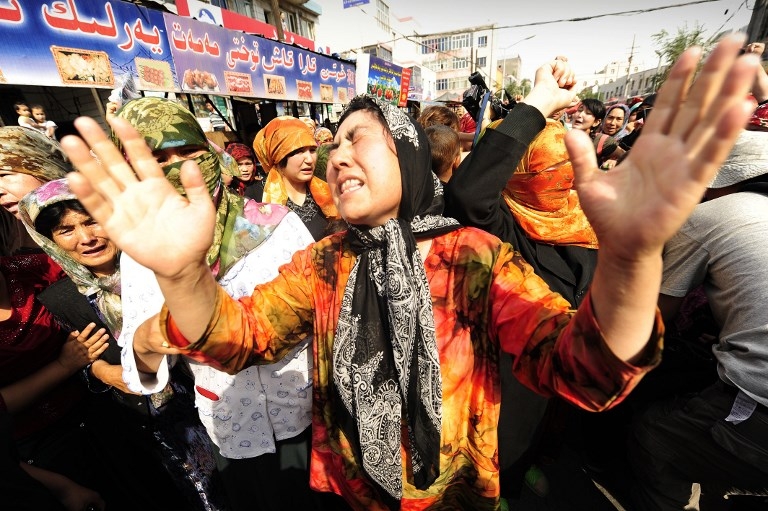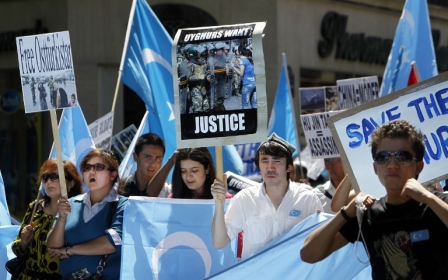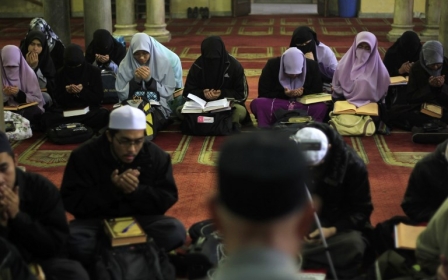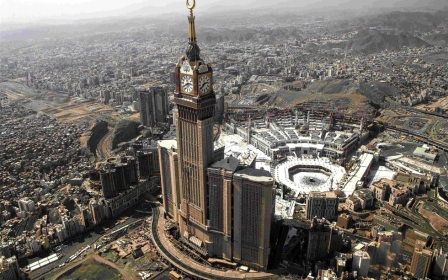China's Hajj crackdown: Uighur Muslims face uphill battle to get to Mecca

Aishe was 16 when she completed the Hajj. Coming all the way from China, she made the journey to Mecca with her father.
"It took my breath away the first time I saw the Kaaba," said Aishe, an Uighur Muslim from the Xinjiang province in China who undertook the pilgrimage last year.
"Having prayed in this direction my whole life, it was nothing like seeing a picture of it on the television. I just started crying."
Aishe did things a little differently. Instead of waiting until she was 60 to get permission from the Chinese authorities, she went to Saudi Arabia, where her father was already employed, on a worker's visa four months before the Hajj.
But it came at a price. After they returned home to China for a holiday, her father was paid a visit.
"The Chinese authorities went to our house in Urumqi asking about my whereabouts. They took my dad's passport and cancelled his permit to go back to Saudi Arabia," said Aishe.
Aishe, who was not in the family village when her father was questioned, left the country.
"My father told me to return to Saudi Arabia... I went back to Saudi and then went to Turkey.
"I haven't seen my family since."
Aishe is not alone in this situation.
Like thousands of Uighur Muslims who live in Xinjiang, restrictions imposed by Beijing - including being at least 60 years old - have led to many seeking alternative routes to get to the Hajj.
Last year, more than 100 Uighur Muslims were stranded in Istanbul after they attempted to go to the Hajj using fake passports from Kyrgyzstan.
Many are thought to have gone into hiding in Turkey, while others were deported to China.
Passport control
More than 10 million Uighur Muslims live in the predominantly Muslim autonomous province of China, known officially as Xinjiang and locally as East Turkestan.
Despite forming the majority in the province, they have faced heavy restrictions that have limited their ability to travel and practise their religion.
Forming one of the five pillars of Islam, the Hajj is an obligation for every Muslim to do it at least once in their life.
And like every country, China is given a quota on the number of Muslims it is allowed to send to the Hajj.
But the main obstacle facing many Uighurs is their ability to get a passport. Last year, China told every citizen in Xinjiang province to hand in their passport.
Activists said passports have not been returned to Uighurs.
The move was justified by Beijing as a means to maintain "social order" after riots in recent years and a crackdown on practising religion.
According to Human Rights Watch, China ordered the confiscation of passports from Tibetans, Hui and Uighur Muslims amid fears that "attending religious teachings abroad... could be a potential cover for subversive political activity".
Alternative routes
During the late 1970s, after China began its open-door policy and started to issue passports to its citizens, Uighurs went in droves to visit Mecca and Medina, locals say, despite an official ban on attending Hajj that was not repealed by the Chinese authorities until the 1980s.
Omer Kanat, who is the vice president of the World Uyghur Congress, said many went to Hajj through "long and very difficult routes" to get to Saudi Arabia.
"Some took the train to Moscow and from there would come to Istanbul, and from Turkey, they got a Hajj visa from the Saudi embassy to go to Saudi Arabia," Kanat told MEE.
"They travelled by land from Kashgar to Tashkurgan, and then across the border to Pakistan and from there, thousands of Uighurs went to Hajj."
These routes, however, were restricted after Chinese authorities began to imprison Uighur and Hui Muslims who went to the Hajj via alternative routes that didn't pass through Beijing.
China distributes the roughly 12,000 places it has among its 30 Muslim-majority provinces via applications to its religious affairs department from prospective pilgrims.
The majority of the permits go to government officials and security guards accompanying the Hajj delegation from China, according to Uighur activists.
Once a pilgrim has applied, they are then subject to further security checks by the Chinese authorities before being given permission to go.
China worries that these Uighurs might meet or see someone or something against China
- Nijat Turguhun, head of Sweden's Uyghur Education Association
Nijat Turguhun, who heads the Uyghur Education Association in Sweden, told Middle East Eye that these checks include looking at a pilgrim's criminal record and whether they "submit to the Chinese authorities".
"This year China started a special course for Uighur pilgrims who would go to Hajj, which means they have to undergo ideological brainwashing," Turguhun said.
"China worries that these Uighurs might meet or see someone or something against China."
He added: "The level of scrutiny and checks has forced many to not bother thinking about going to the Hajj. Imagine?"
Monitored by security guards
After these checks, pilgrims' passports are returned to them by the authorities.
Other Uighur activists have told MEE that pilgrims are accompanied by intelligence agents who monitor their behaviour and prevent them from talking to anyone outside their group.
As most of the pilgrims are over the age of 60, because of the government-imposed age restrictions, for many this spiritual journey becomes a physical endurance test.
The Hajj, which lasts about five days, is made more difficult for elderly pilgrims as the Chinese have forbidden relatives to accompany them - only one Muslim per family is allowed to attend Hajj each year.
"I saw elderly pilgrims struggling to complete the Hajj because of their age," Aishe said.
"They were not allowed to talk to other Uighurs and they were always in the presence of security guards from China pretending to be Muslim."
Unofficial figures, obtained by activists, estimate that about 1,400 Uighur Muslims were given a chance to attend the Hajj this year out of the 12,800 Chinese Muslims going to Saudi Arabia.
Aishe continues to remain in exile, now living in Istanbul.
"When I got to do Hajj my family were proud of me.
"They understand that it was a small price to pay to fulfil my right to do the Hajj."
Additional reporting by Jenan Ashi.
This article is available in French on Middle East Eye French edition.
New MEE newsletter: Jerusalem Dispatch
Sign up to get the latest insights and analysis on Israel-Palestine, alongside Turkey Unpacked and other MEE newsletters
Middle East Eye delivers independent and unrivalled coverage and analysis of the Middle East, North Africa and beyond. To learn more about republishing this content and the associated fees, please fill out this form. More about MEE can be found here.





